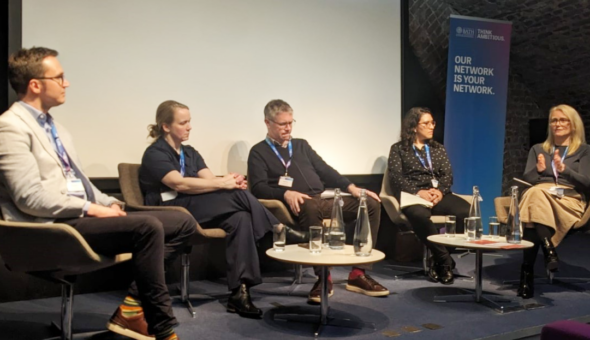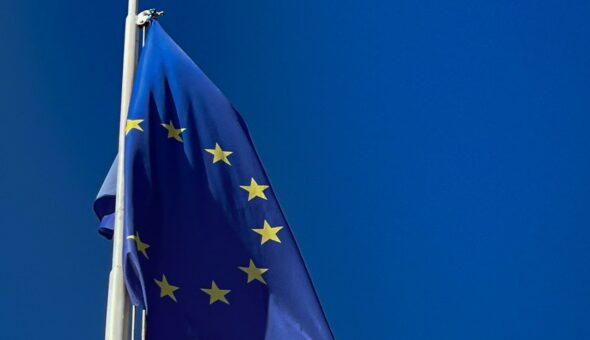In our post-truth times, we are in need, more than ever, of public intellectuals. Sadly, we recently lost one of our own most spirited and courageous free thinkers in the business and society field, Malcolm McIntosh, a Senior Visiting Fellow at the School of Management. Malcolm passed away on 7th June 2017 after a long battle with cancer. In this extract from his forthcoming book, In Search of the Good Society, he speaks of the need for elites such as academics and other experts to reengage meaningfully with society in order to address the world's most pressing social and environmental problems. We shall greatly miss not having Malcolm with us on that journey, but his words shall remain a touchstone.
We have challenges that must be considered carefully and tackled with quiet and earnest intent: reforming the global financial system to bring it back within our control; developing economies that nurture, rather that destroy our natural capital; managing the development of biotechnology such that it provides solutions, and does not create problems; keeping control of AI, such that, as with the development of writing and printing, we know where we are going and have some control; and, turning our media tech companies into responsible publishers so that they are subject to the sort of social controls that govern our print media and daily libel and slander laws. If democracy is to work, and be more of a viable option for the 50% who don’t currently have it, it must be based on what Edmund Burke, and more recently Amartya Sen, call ‘public reasoning’. Burke said that ‘the only thing necessary for the triumph of evil is for good men to do nothing’ - and in this time fake news and ‘alternative facts’.
This requires the empowerment of what Pierre Bourdieu, and more recently Edward Said, call ‘the public intellectual’ who through clear public engagement restore the role of the expert and dispel the propagandists that populated the Nazi regime and drive the Trump administration and the Brexiteers. Those who voted nihilistically against those they thought to be the elite, who were the elite, must be engaged so that they can see the wholeness of society, both locally and globally, or we are doomed. Rather than coasting on our laurels we must reengage with everyone, everywhere. We must win the argument with reason.
This ‘high-opportunity, high-risk’ society is open to everyone, but also only those who have access to education and free information. As Antony Giddens says: ‘knowledge and innovation always cut both ways’. The future does not lie with nativism or isolationism. Indeed such moves defy the tide of history, the interdependent nature of all our lives, what we now know about the science of the planet, and what Karl Jung called our collective unconscious which holds the soul of humanity. At the heart of the good society should be an understanding of what Jung called instinct, for these aspects are central to what it means to be human: hunger, sexuality, activity, reflection, and creativity. And I count both art and science as forms of creativity.
Globalisation, like trade and capitalism its bedfellows, is not dead, it just needs reforming. This is not a binary, it has to be nuanced. A balance must be found on a global basis to forge what Sen calls a ‘democratic global state’ through public reasoning. The forces of financialisation, social media and consumption are out of control and have formed a model of AI such that we are beholden to their algorithmic vicissitudes. As Angus Deaton, 2016 Nobel prize winning economist, has said: ‘I don’t think globalisation is anywhere near the threat that robots are . . . globalisation for me seems to be not first-order harm and I find it very hard not to think about the billion people who have been pulled out of poverty as a result’. Deaton and his wife Anne Case have explained through enormously useful and detailed megadata trawling both the Brexit and the Trump votes: the ruling elites have been completely out of touch with white working class people. For instance, Deaton and Case highlighted the fact that the only demographic group to decline over the last fifteen years in America, because of ‘deaths of despair’, were white, poorly educated, working class men.
This is the same group that in the UK and the US have not only seen zero social mobility, but where the bottom 10% have gone backwards – they are poorer now than they were before. In the US they are now in the same position as the African-American population have always been. Just as it took the Babbage Report in the village of Haworth in Yorkshire a hundred years ago to highlight the appalling toll of poor sewage and the need for clean water so this may be a time for the elites, that’s you and me, to take a look at what really matters for everyone – at the top and the bottom of society. China and parts of Africa continue to pull people up over the poverty line, while the UK, the USA and India continue to oppress working people. Japan and most of Scandinavia have virtually eliminated extreme poverty, while parts of Europe, such as the UK, seem to lack empathy for those who suffer most. In the UK this group voted for Brexit, and in the USA for Trump. In both cases fear and ignorance triumphed. The answer is not xenophobia led by elitists (Trump and the Brexit leadership - Gove, Johnson and Farage – all of whom are rich with elite backgrounds). And the groups that voted for Trump and Brexit shot themselves in the foot, like turkeys voting for Thanksgiving and Christmas.
It is not too late. All the statistics prove that globally we have made good progress over the last seventy years and we will look back and see that 2016 was a moment to take a deep breath and ask what went wrong, and then move forward again. The megalomaniacs, the greedy, those lacking in empathy and many corporate interests will always try to take over, but just as meerkats and bonobos run on cooperation so the best of humanity has been when we collaborate and cooperate. We must work for a feminised future not an avaricious masculine past. The future is liberal, collective and progressive but it requires us not to walk past on the other side or hide in a dark room listening to Beethoven with our headphones on until the world blows over. Art may be the best way forward, for it is through artistic expression in different dimensions that we can see the world afresh.
This is an excerpt from In Search of the Good Society by Malcolm McIntosh, which will be published by Routledge on 26th October 2017.
Responses




Thank you Andrew. Belatedly seen this article and it warms the cockles of my heart. I am writing a book about enterprise and hope, which perhaps you might be willing to read an extract of when it is ready, by the end of 2017.
yeodonovan@gmail.com